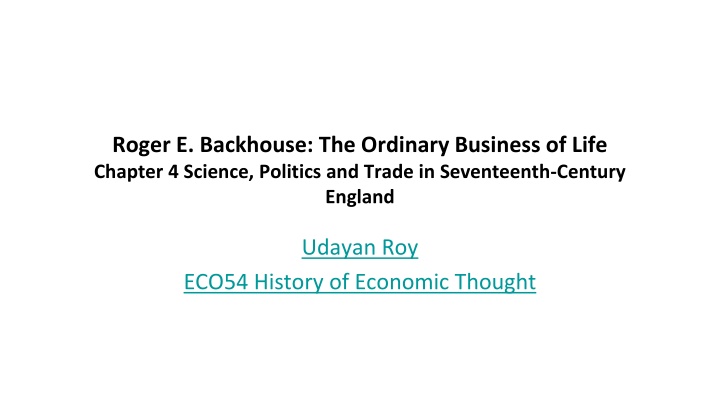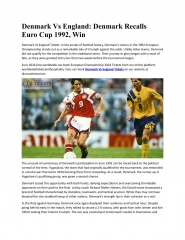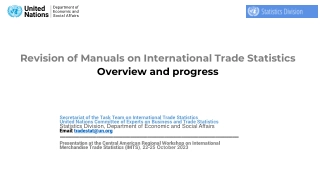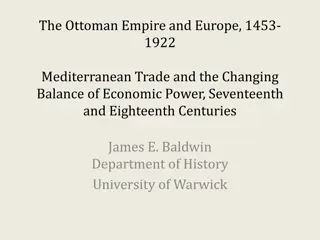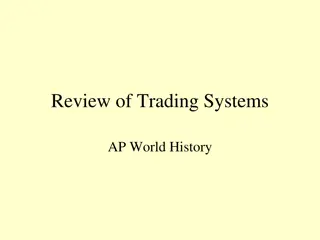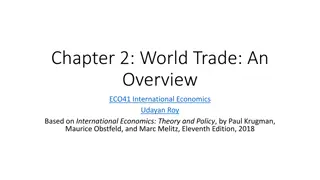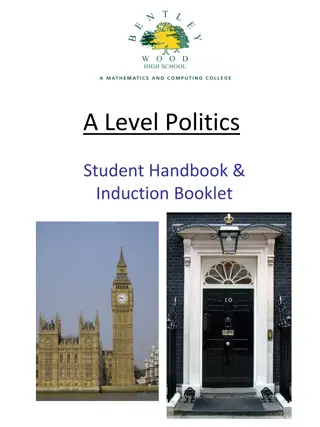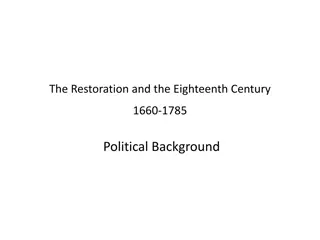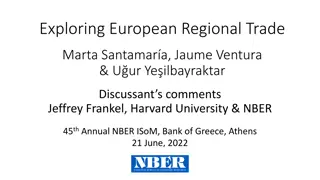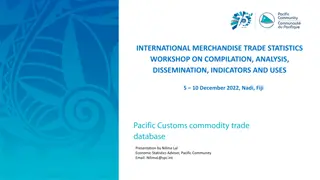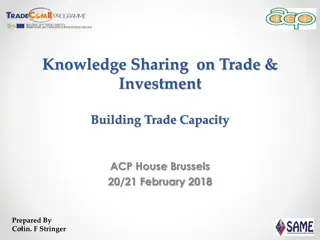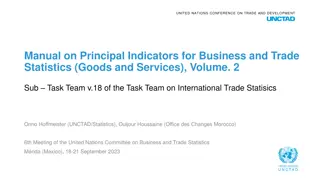Science, Politics, and Trade in Seventeenth-Century England
In Seventeenth-Century England, a combination of scientific advancements, political dynamics, and trade influences shaped economic policy and thought. Key figures like Francis Bacon, Rene Descartes, and William Petty contributed to the era's intellectual landscape by promoting empirical reasoning, measurement, and political arithmetic. The period saw a surge in economic writings, debates on free trade, and discussions on the role of precious metals in monetary policy. This content explores the intersection of science, politics, and trade in shaping economic discourse in Seventeenth-Century England.
Download Presentation

Please find below an Image/Link to download the presentation.
The content on the website is provided AS IS for your information and personal use only. It may not be sold, licensed, or shared on other websites without obtaining consent from the author.If you encounter any issues during the download, it is possible that the publisher has removed the file from their server.
You are allowed to download the files provided on this website for personal or commercial use, subject to the condition that they are used lawfully. All files are the property of their respective owners.
The content on the website is provided AS IS for your information and personal use only. It may not be sold, licensed, or shared on other websites without obtaining consent from the author.
E N D
Presentation Transcript
Roger E. Backhouse: The Ordinary Business of Life Chapter 4 Science, Politics and Trade in Seventeenth-Century England Udayan Roy ECO54 History of Economic Thought
Seventeenth-Century England The Royal Society Political ferment Dutch commercial power Balance-of-trade doctrine The rate of interest and the case for free trade Recoinage crisis Conclusions SEVENTEENTH-CENTURY ENGLAND 2
Seventeenth-Century England There was an explosion of writings on economic policy by merchants and businessmen arguing in favor of the policies that would be good for them However, despite the biases, some writers showed careful and subtle analysis SEVENTEENTH-CENTURY ENGLAND 3
Science Francis Bacon (1561 1626): induction from facts and experiment Rene Descartes (1596 1650): deduction from simple, self- evident truths Both believed in measurement Either as a source of ideas (generalizations) Or as a test of intuition Both rejected authority as a source of knowledge These ideas were profoundly influential SEVENTEENTH-CENTURY ENGLAND 4
William Petty (1623 87) Political Arithmetic instead of using only comparative and superlative words, and intellectual arguments, I have taken the course to express my self in terms of number, weight or measure; to use only arguments of sense, and to consider only such causes, as have visible foundations in nature. SEVENTEENTH-CENTURY ENGLAND 5
William Petty Prepared estimates of England s national income Made major contributions to national income accounting Estimated the split of income into wages, profits, and rent National expenditure (or output) = national income Asset income/asset value should be the same for all assets. Ratio of rent to value of land = ratio of profits to value of capital SEVENTEENTH-CENTURY ENGLAND 6
William Petty Mercantilist, on the need for precious metals and tariffs Argued that increases in the quantity of money led to decreases in interest rates This is part of the modern view of monetary policy Petty s work on measurements was continued by: John Graunt (1620 74) and Gregory King (1648 1712) SEVENTEENTH-CENTURY ENGLAND 7
William Petty Video: http://www.mruniversity.com/courses/great- economists-classical-economics-and-its-forerunners/sir- william-petty SEVENTEENTH-CENTURY ENGLAND 8
Political Arithmetic Adam Smith and other eighteenth and nineteenth century economists were skeptical about the value of quantitative measurements It was only in the twentieth century that the ideas pioneered by Petty and his followers were revived and became important SEVENTEENTH-CENTURY ENGLAND 9
Political Turmoil Political turmoil in seventeenth century England raised questions about what motivated people and what held societies together Writers such as Thomas Hobbes began to think that the pursuit of economic gain could be a substitute for the pursuit for political power, which is at the root of political turmoil SEVENTEENTH-CENTURY ENGLAND 10
Political Turmoil Hobbes s discussion had the side effect of solidifying the notion that people are strongly motivated by the pursuit of economic gain SEVENTEENTH-CENTURY ENGLAND 11
Thomas Hobbes Leviathan In Leviathan (1651), Hobbes, possibly influenced by civil war in England and Germany, argued that the pursuit of self interest was such a strong motivator of people that society could be held together only if the people chose a sovereign who would become both the law giver and the law enforcer SEVENTEENTH-CENTURY ENGLAND 12
Thomas Hobbes Leviathan Hobbes was not only addressing a fundamental question in social science how would society be held together but reached his conclusions by working out the social implications of rational behavior of individuals In this way, Hobbes went farther than Machiavelli Hobbes s methodology became hugely influential in economic thinking His top-down conception of society would, however, yield in time to a more benign view of the social consequences of self-interested behavior SEVENTEENTH-CENTURY ENGLAND 13
Balance-of-trade doctrine From 1620 to 1624, England faced declining sales of cloth to Europe. England was losing precious metals to other countries. It was a crisis. Gerard Malynes (1586 1641) argued that currency traders were artificially keeping the exchange value of English coins below the value suggested by metal content. This made English coins more valuable as metal in foreign lands. Malynes suggested government regulation to increase the exchange value of English coins. That way, more gold and silver would be received for exports and less would be paid for imports. SEVENTEENTH-CENTURY ENGLAND 14
Balance-of-trade doctrine Edward Misselden (1608 54) and Thomas Mun (1571 1641) argued that the exchange rate should be reduced even further. The cheaper it was to buy English coins, the cheaper it would be to buy English goods. This would boost England s net exports and reverse the outflow of precious metals. SEVENTEENTH-CENTURY ENGLAND 15
Balance-of-trade doctrine Malynes is correct if exports and imports are unresponsive to prices, and Misselden and Mun are correct if exports and imports are responsive to prices. But both sides agreed that trade deficits were undesirable Both sides saw monetary factors as an important influence on foreign trade SEVENTEENTH-CENTURY ENGLAND 16
Interest rates Josiah Child (1630 99) argued that the government-set interest rate should be reduced, because lower interest rates lead to greater output SEVENTEENTH-CENTURY ENGLAND 17
Interest rates John Locke (1632 1704) argued that a lower interest rate would reduce the availability of loanable funds. Locke also argued that each country had a natural interest rate determined by the supply and demand for money. The latter that is, the demand for money would depend on total output and the quickness of circulation of money. Today s textbooks call this the velocity of money. SEVENTEENTH-CENTURY ENGLAND 18
Trade and welfare: dissent Dudley North (1641 91) broke with the prevailing ideas that favored protectionism Trade is caused by differences between the endowments of people This idea also explains trade in capital (lending and borrowing) and in land (renting) SEVENTEENTH-CENTURY ENGLAND 19
Trade and welfare: dissent Dudley North saw rent and interest as essentially the same thing Also, availability of land (capital) determines rent (interest), not the other way around Legislative control of interest rates would be fruitless North argued that having lots of precious metals was not crucial. If you had land or capital, you could produce things and sell them for precious metals SEVENTEENTH-CENTURY ENGLAND 20
Conclusions Seventeenth century economic thinking in England was basically mercantilist, as epitomized by the balance-of-trade doctrine Irrespective of the actual intent of the writers, doctrines were used to support protectionist interests. SEVENTEENTH-CENTURY ENGLAND 21
